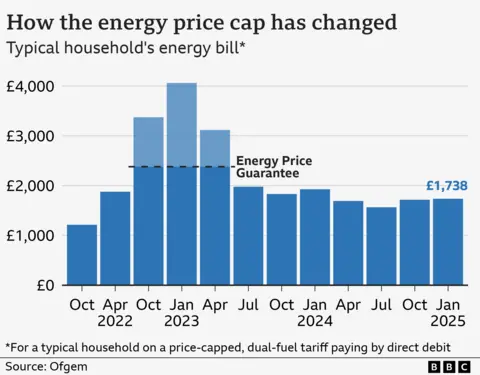Cost of living correspondent
 Getty Images
Getty ImagesEnergy regulator Ofgem is to publish its latest price cap, with households expected to face another increase in gas and electricity costs in April.
The cap, which puts a limit on the amount suppliers can charge for each unit of energy, affects the bills of 26 million homes in England, Wales and Scotland.
Analysts have forecast a 5% increase in prices, owing to a rise in the wholesale costs paid by suppliers.
A rise would hit people’s finances at the same time as water and council tax increases, although average wages are also going up.
Third increase in a row
Households on default or variable tariffs are affected by the price cap, which is set every three months by Ofgem. The new cap coming into force on 1 April will be published at 07:00 GMT.
While the cost of each unit of gas and electricity is capped, the total bill is not, so household bills will vary depending on how much energy is used.
The regulator illustrates the cap by showing the impact on the annual bill of a household with typical energy usage.

Analysts at consultancy Cornwall Insight, widely regarded for accurate predictions, have forecast that a household using a typical amount of gas and electricity will have £85 a year added to its bill from April, taking the annual cost to £1,823 a year.
They said the predicted rise was the result of a combination of colder weather and a fall in gas storage levels across Europe, which has led to a sharp increase in wholesale prices.
If a rise in the cap is confirmed, it would mean a third successive increase in energy bills, prompting further calls for consumers to shop around for a better deal, and for the government to step in to assist struggling billpayers.
“The burden of high energy bills has gone on long enough and as long as our energy bills remain tied to the cost of gas, households continue to be at the mercy of global markets and the fossil fuel industry,” said Simon Francis, co-ordinator of the End Fuel Poverty Coalition.
“But alongside the transition away from reliance on gas, it’s crucial to provide support for vulnerable households struggling with energy costs now and to invest in improving energy efficiency of homes.”
A period of high prices means households have collectively built up debt of £3.8bn to suppliers.
The average household in arrears owes more than £1,500 for electricity and £1,300 for gas.
Bills are about 50% higher than pre-Covid levels, but remain below the peak reached in 2022 when Russia’s full-scale invasion of Ukraine caused energy prices to spike.
The latest announcement on the cap comes days after the regulator published plans to offer a choice of tariffs that shift standing charges elsewhere on people’s bills.
These fixed fees, which pay for the connection to gas and electricity, have been controversial, but there was an immediate backlash against these plans.

How to keep energy use – and bills – down
Experts have shared three tips to keep on top of energy use during the warmer months:
- If your hot water is too hot to wash your hands in, then your setting is too high so turn the boiler down
- Manage your draughts, such as putting a black bag with scrunched up paper up an unused chimney, or limit other draughts around the home
- Limit time in the shower to four minutes. The charity WaterAid has compiled a playlist of four-minute songs to keep you to time
Source link
